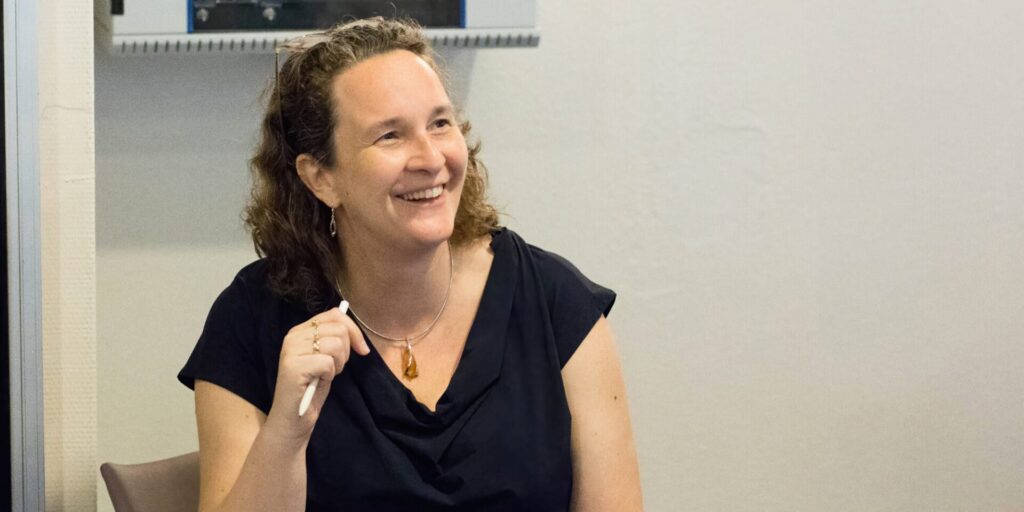“For a small organisation like ours, with uncertain funding, this setup is simply ideal.”
With a background in hospitality, a career start in the music industry, and a year spent in the remote Himalayan mountains of Bhutan setting up a hotel school, Niki Kervezee is anything but your average director.
As COO of IIED Europe, she leads a young, agile organisation in the international non-profit sector—an environment where working with a virtual assistant proves to be a smart choice.
In this interview, Niki shares how her VA Jamie brings structure and continuity to a dynamic team.

Gosh, where do I start? My background is in business—I studied at hotel school and earned a degree in Business Administration. I then spent several years working in the music industry before deciding to change direction.
I moved to Bhutan for a year, right in the middle of the Himalayas, to help set up a hotel school. It was a unique and intense year—probably the biggest baptism of fire I’ve had, around the age of 30. We lived literally on top of a mountain, together with a hundred students and local staff, completely off the grid. The responsibility was immense and the school was constantly under financial pressure. I didn’t know Bhutan at all, so it was a huge culture shock—but also incredibly inspiring. That’s where I realised just how valuable business skills are in a non-profit environment, where many people come from more scientific or social backgrounds.
After that, I joined WWF, where I ran special projects for several years and later moved into Global Strategy and Operations. During that time, I also completed a part-time MSc—twenty hours of study alongside a full-time job, during COVID, with a newborn. A tough period!
After seven years at WWF, I was ready for a change—mainly because the long commute wasn’t sustainable with a small child. That’s when I found the role at IIED Europe. As COO, I’m responsible for all things operational: finance, legal, HR and IT. I co-lead the organisation with another director who focuses on strategy.
IIED Europe is a young and intentionally small organisation. We stay agile by outsourcing key functions like finance and IT—which is how I came across Moneypenny.
I already knew about Moneypenny through Charlotte Tee, who I studied with at hotel school. I’d also spoken to Marianne Sturman before, so the name was familiar.
At one point, I was completely swamped. I thought: “I just need someone who can take a few smaller things off my plate.” Of course, some tasks are too sensitive or too internal to delegate—like changes in our HR database—but having a VA has definitely brought relief. It’s helped us stay on track and avoid things falling through the cracks.
In fact, we initially had two major, urgent projects that we needed help with straight away.
Having a VA brought real relief. It’s helped us stay on track and made sure nothing got left behind.
Jamie started by helping us tackle those urgent projects. She introduced me to ChatGPT, actually. I was sceptical at first, because it had previously been used for important tasks—like HR documents—without proper review. I see it more like an intern: you can give it work, but you always need to check the output. I’m really glad Jamie has had training in AI and uses a pro account—it saves me from having to explore it all myself.
Now that those big projects are done, Jamie supports us with day-to-day operational tasks. When a colleague left the team in Spain and we needed to get their laptop back, I remember thinking, “How are we going to sort this?” I asked Jamie, and she took care of everything—from packaging to pick-up and delivery. Those kinds of tasks would otherwise drag on or disrupt my day.
She also helps with project management. After management or supervisory board meetings, she turns the minutes into clear action points, tracks progress using a Red-Orange-Green status system, and monitors deadlines. She maintains our database of potential funders and partners, including follow-up tasks like “send PowerPoint deck.”
Looking ahead, I expect Jamie will help with project managing two new recruitment processes after the summer. We don’t have anyone internally for that, and it’s a lot of work. We’re also moving offices this summer, which comes with plenty of admin—something I’d love her help with too.
It’s a varied role, but that’s exactly what makes Jamie so valuable. She’s a flexible management assistant—sometimes more of an office manager, sometimes working on HR and recruitment.
Those kinds of tasks would otherwise drag on or disrupt my day.
It works perfectly. I’ve been working remotely for nearly ten years—long before it became common—starting with my role at WWF International. I’m completely used to working with colleagues I’ve never met in person.
My team here in the Netherlands is fine with it too. We meet in the office once a week, and most people live outside of Amsterdam, so they prefer not to travel more often. So yes, remote collaboration works really well for us.
The biggest benefit is flexibility. As a small organisation with uncertain funding, it’s incredibly useful to be able to scale up, scale down or even pause support when needed.
It’s also a financially smart solution for us. We simply don’t have the budget to hire someone—even part-time.
Plus, a VA can take on tasks that would otherwise be disruptive to our workflow, like arranging the return of that laptop.
As a small organisation with uncertain funding, it’s incredibly helpful to be able to scale up, down or even pause support.
I wouldn’t call it a downside—it’s more of a trade-off. If you have someone physically in the office, you can ask them to handle things that need to be done on-site, like ordering a new nameplate or booking a meeting room at reception.
Of course, Jamie can’t do those tasks remotely, so I handle those myself. But honestly, those small things don’t outweigh the flexibility virtual support offers.
Things definitely slow down a bit in the summer, as we’re all partially off or on holiday. After the two big projects were completed, I reduced Jamie’s hours slightly so she could continue supporting us with day-to-day tasks without larger projects running.
The fact that we could adjust her hours so easily was a huge plus.
I think Moneypenny’s concept works really well. The flexibility is a big draw—especially for a small organisation like ours with limited funding. Being able to scale support up or down is incredibly useful.
I also felt really well guided during the selection process. I had productive conversations with Marianne to figure out what we needed and who would be a good fit. Our account manager, Merel, also checked in a few times.
But in the end, I’m mostly just really happy with Jamie. I always think: if the output is good, then the agency behind it must be doing something right. You can tell that Moneypenny is selective about who they hire—and it shows.
Absolutely—especially for organisations already used to working with virtual teams. It’s almost a no-brainer.
I also see a lot of potential in the non-profit sector. There’s a lot of uncertainty at the moment: funding is drying up, and some organisations are having to cut their teams in half. We’ve managed to stay stable, mainly because we outsourced early on.
I’m seeing increasing demand for models like yours—flexible HR and financial support in particular. My own finance team is also fully remote and only visits the office maybe twice a year.
The flexibility Moneypenny offers is hugely valuable. For small organisations like ours, it’s an ideal financial solution.
For organisations already working virtually, it’s almost a no-brainer.
Want to learn more about IIED Europe? Visit their website or follow them on LinkedIn.
Visit our Virtual Assistance page to learn more about our services and pricing, or book a no-obligation call to explore the possibilities.
Get to know us online and ask all your questions. Or read more about our VA services.

